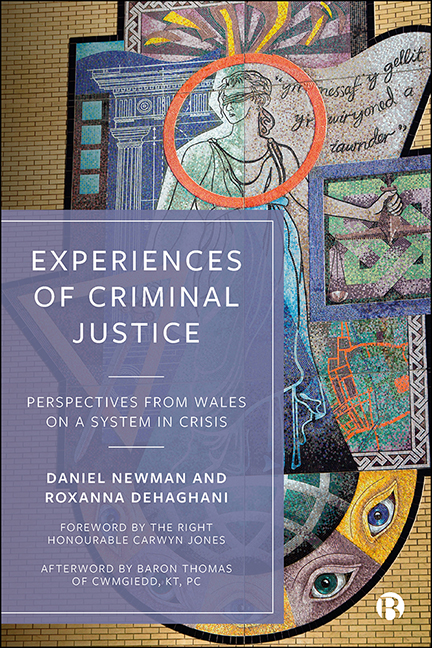Book contents
- Frontmatter
- Contents
- List of Figures and Tables
- Foreword
- Acknowledgements
- 1 Why Wales?
- 2 A System in Crisis
- 3 The People and Their Experiences
- 4 Criminal Justice in Its Place
- 5 Pressures of Practice
- 6 Criminal Justice Relationships
- 7 Navigating the Criminal Justice System
- 8 Doing Criminal Justice Differently
- Afterword
- References
- Index
8 - Doing Criminal Justice Differently
Published online by Cambridge University Press: 15 September 2022
- Frontmatter
- Contents
- List of Figures and Tables
- Foreword
- Acknowledgements
- 1 Why Wales?
- 2 A System in Crisis
- 3 The People and Their Experiences
- 4 Criminal Justice in Its Place
- 5 Pressures of Practice
- 6 Criminal Justice Relationships
- 7 Navigating the Criminal Justice System
- 8 Doing Criminal Justice Differently
- Afterword
- References
- Index
Summary
Introduction
In this chapter we draw together our findings and point towards the future for research on both criminal justice more broadly, during and after austerity, as well as, specifically, criminal justice in Wales. Thus far, we have told the story of how austerity has impacted upon individuals’ experiences of criminal justice, examining thereafter the impacts on criminal defence, particularly that which is legally aided, and on other justice institutions such as the courts, the prosecution and the police. Our focus has been on how criminal justice has been experienced in Wales, and while our data is in some ways specific to south Wales, there are also many findings that can be generalized beyond Wales and to the whole of the England and Wales jurisdiction. Such findings may also be relevant to other jurisdictions that are facing difficulties in the wake of budget cuts and efficiency measures.
In Chapter 1 we explored the historical, cultural, geographic, socio-economic and legal landscapes in Wales and how they compare with England. We argued that criminal justice research must be conducted in Wales and should take account of locality given its impact on how justice is served and experienced. In Chapter 2 we explored the impact of austerity, and more deep-rooted neoliberalism, in England and Wales, while thereafter exploring the specific impact on Wales itself. Chapter 2 also detailed vulnerability theory – which underpins the research and will be considered again in this chapter – and the ways in which the theory prompts consideration of the implications for experiences of the criminal process and the ability of individuals to achieve justice. Across Chapters 3 to 7 we explored the narratives of those we interviewed, identifying key themes such as the underfunding faced by practitioners and accused persons’ previous experience of criminal justice. We entered the research expecting to consider the role of underfunding but the importance of the ‘first-timer’/‘regular division is one that only came to our attention during the fieldwork. Both themes, though, emerged organically from the accounts that were provided by those we interviewed, and we followed the interviewees’ leads to draw out their significance. These themes frame and inform many of the experiences that followed.
- Type
- Chapter
- Information
- Experiences of Criminal JusticePerspectives from Wales on a System in Crisis, pp. 203 - 222Publisher: Bristol University PressPrint publication year: 2022



